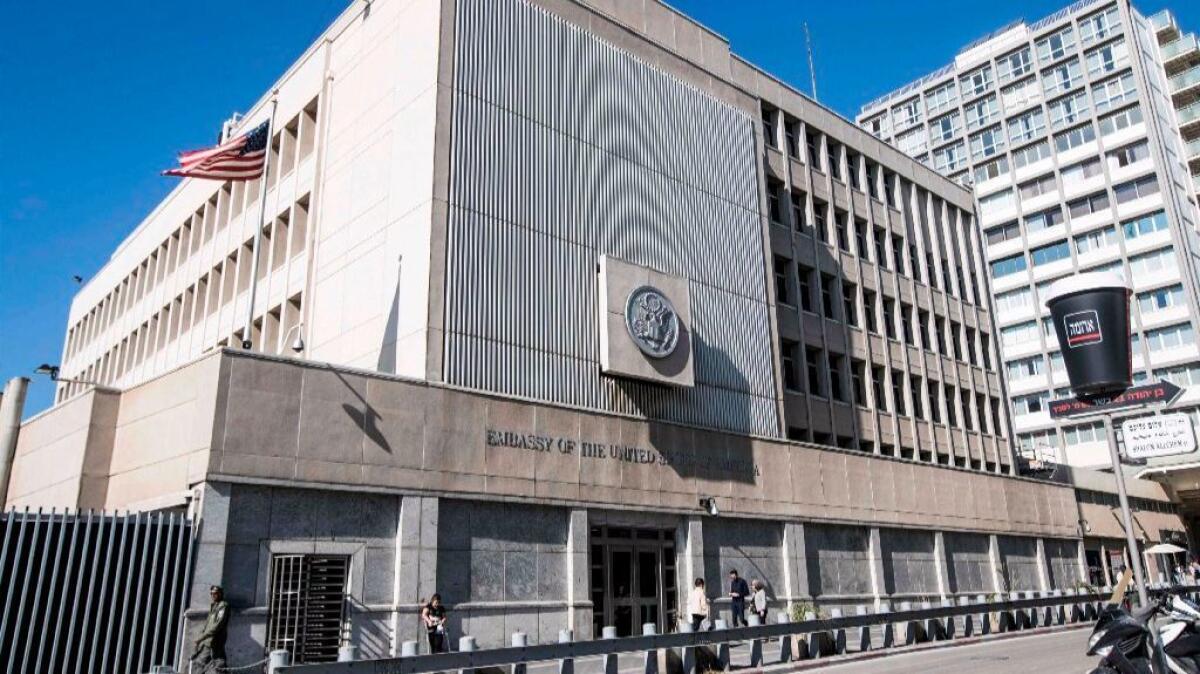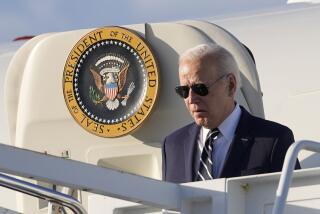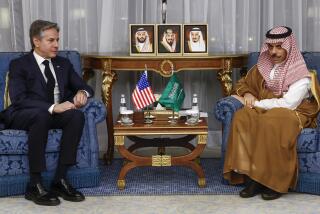Trump poised to move U.S. Embassy from Tel Aviv to Jerusalem and declare the ancient city the capital of Israel

President Trump is preparing to formally declare Jerusalem the capital of Israel and order a review of the best way to move the U.S. Embassy from Tel Aviv, two officials said Thursday, actions that would reverse decades of U.S. policy and international peacemaking efforts, and could inflame the Arab world.
The White House hosted a high-level meeting Monday to discuss plans for transferring the embassy to the ancient holy city and to discuss a deadline Friday that requires the administration to notify Congress every six months if it will order the move — or issue a waiver, as previous administrations have done.
To the surprise of senior officials in attendance, Trump crashed the meeting with his own detailed agenda, according to a person familiar with White House deliberations.
A scheduled 30-minute meeting on waiving the 1995 law that requires the U.S. to move the embassy stretched to two hours, and Trump stayed for nearly half of that. He asked detailed questions, saying delaying the move indefinitely was unacceptable, and demanded options other than issuing a waiver.
It reminded some in the room of Trump’s frustration with being asked to certify to Congress that Iran was in compliance with the nuclear disarmament deal. In October, he did not do so even though the United Nations nuclear watchdog agency and the U.S. intelligence community had concluded that Iran was meeting its obligations under the 2015 accord.
Under the Jerusalem Embassy Act of 1995, which was signed by President Clinton, the president must certify to Congress every six months that it is in the U.S. national interest to keep the U.S Embassy in Tel Aviv, rather than in the disputed city of Jerusalem. Every president since Clinton has done so.
Trump is likely to issue a waiver again Friday, but order a review of moving the embassy with the intention of eventually doing so, said the person familiar with the deliberations. In recent months, aides have persuaded him to delay a move to minimize the potentially disastrous impact on U.S. interests in the Middle East.
A final decision has not been made, however. Aides are preparing a speech about Israel for Trump to deliver next week and he may use it to make a strong pronouncement about Jerusalem being the capital of Israel.
Trump vowed on the campaign trail last year to move the embassy to Jerusalem, and Vice President Mike Pence renewed speculation on Tuesday when he said in New York that Trump is “actively considering when and how” to do so.
White House Press Secretary Sarah Huckabee Sanders said Wednesday that it was “premature” to discuss a decision on declaring Jerusalem the capital. Another White House official, speaking on condition of anonymity, said Thursday that Trump “has always said it is a matter of when, not if. The president is still considering options and we have nothing to announce.”
When he took office, Trump promised to make the “ultimate deal” by forging peace between Israel and the Palestinians. But he sidelined the State Department, with its reservoir of diplomatic talent and Middle East expertise, and handed the task to his son-in law, Jared Kushner, and his former lawyer, Jason Greenblatt, who was named special envoy.
No discernible progress has been made although Trump has heralded a new willingness of Saudi Arabia, which does not have formal ties with Israel, to deal with the government of Prime Minister Benjamin Netanyahu and to assist in promoting a solution to the bitter conflict.
Even before Israel was established 70 years ago, Jewish leaders have envisioned Jerusalem as their “eternal and undivided” capital.
But Palestinians also claim the historic city of glowing limestone and honey-hued light. It is revered by the three main monotheistic faiths: Judaism, Islam and Christianity.
In 1967, Israel fought Arab states in what came to be known in the West as the Middle East War, or the Six-Day War. Emerging as the victorious underdog, Israel was able to seize east Jerusalem, its central Old City and the West Bank from the neighboring kingdom of Jordan, as well as the Golan Heights from Syria and part of the Sinai Peninsula from Egypt.
The “final status” of Jerusalem has been in dispute ever since, regarded by the international community as a matter to be decided only when a final peace agreement establishing a Palestinian state to live alongside Israel is reached.
Trump’s preemptive move would throw that formulation into disarray.
Aaron David Miller, a longtime negotiator in the Middle East for Republican and Democratic administrations, said recognizing Jerusalem as the capital of Israel would be “the single dumbest move this administration has made in the Middle East.”
“Why now?” asked Miller, now a scholar at the nonpartisan Wilson Center think tank. “There is not a single U.S. national security interest in this.”
Palestinians have been dismayed at Trump administration efforts that they say have shown little understanding of the complex conflict and no regard for their longstanding grievances.
Trump has named his former bankruptcy lawyer, David Friedman, as U.S. ambassador to Israel. Friedman, along with Kushner, for years supported and donated money to the settler movement in Israel, helping to expand Jewish towns in the West Bank territory claimed by the Palestinians.
Most of the world considers the Israeli settlements to be illegal, in violation of Geneva Conventions that forbid the populating of occupied territory by the occupying force.
The U.S. government has backed away from calling the settlements illegal; Trump’s critique has been even milder, saying only they are not “helpful” to the pursuit of peace.
Earlier this year, King Abdullah of Jordan met with Trump and persuaded him to hold off on changes regarding the status of Jerusalem, arguing that his own nation’s predominantly Palestinian population would respond in anger strong enough to topple his government.
Abdullah was in Washington again this week but did not meet with Trump.
Declaring Jerusalem the capital of Israel would also sour what had been Trump’s enthusiastically friendly relationship with several Gulf Arab states, especially Saudi Arabia and its new crown prince, Mohammed bin Salman, widely known as MBS.
“This would clearly undermine the budding bromance between Trump and MBS,” Miller said.
Trump had also been able to form something of an odd-bedfellow coalition of Washington, Saudi Arabia and Israel to counter Iran, the region’s other, much-despised superpower. That work would also be eroded, experts say.
The 1995 U.S. law says Jerusalem “should be recognized” as the capital of Israel and, at the time, required that the U.S. Embassy “should be established in Jerusalem no later than May 31, 1999.”
Presidents Clinton, George W. Bush, Obama and Trump all issued successive six-month waivers to the law and claimed keeping the embassy in Tel Aviv was “necessary to protect the national security interests” of the United States
When Trump signed the most recent waiver on May 31, his spokesman at the time, Sean Spicer, said, “The question is not if that move happens, but only when.”
Staff writer Noah Bierman in Washington contributed to this report.
Twitter: @TracyKWilkinson
More to Read
Start your day right
Sign up for Essential California for news, features and recommendations from the L.A. Times and beyond in your inbox six days a week.
You may occasionally receive promotional content from the Los Angeles Times.








